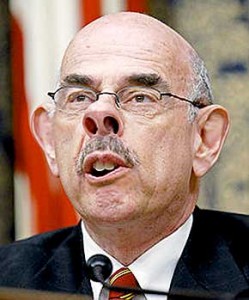Charles Krauthammer points out that BHO’s financial-reform bill is a move toward a further increase in the overweening powers of the Executive branch, which will now be able to seize a firm it designates as systemically risky. Where was Krauthammer during the Bush administration? It invented the doctrine of an overreaching executive. Still, he is right.
Michele Bachmann sums up the impetus of the bill: privatizing profits; socializing losses. (By the way, Bachmann is infinitely superior in intelligence to Palin who’s only growing more ignorant with notoriety. The more I see of Bachmann, the more impressed I grow with her demeanor and unshakable command of the facts.
Here is The Wall Street Journal’s “Factsheet: Senate Financial-Regulation Bill”
Update I (April 27): As Fox News legal analyst Judge Andrew Napolitano has been pointing out, the bogus lawsuit against Goldman-Sachs, a major donor of Obama and the beneficiary of a bailout, is political theater designed to prepare the public for the passage of enormously intrusive financial regulation.
The Heritage Foundation on “The Dodd Bill:
“Congressional Democrats and the Obama Administration want to create a permanent bailout mechanism all [the] while spouting their rhetoric of getting tough on Wall Street, but if you look at who is already lining up to support their ‘reform’ measure it’s a who’s who of the big banks that have already received the taxpayer bailout the first time.” … “Wall Street supports this measure. Why? Because big investment houses realize they’ll get bailed out and would have less reason to worry about risky behavior.”
“Sen. Chris Dodd (D.-Conn.) crafted the Senate version of so-called ‘Financial Reform’ with the support of the President. The procedure used to date resembles the non-transparent and secretive tactics used to pass ObamaCare. The Senate Banking committee marked up the bill in 22 minutes, with no amendments offered and no debate allowed. …
“There are two specific problems with the Senate approach to ‘reform.'”:
“First, this legislation would create a new $50-billion bailout slush fund controlled by the Federal Deposit Insurance Corporation (FDIC). Very big banks and other ‘eligible financial companies’ would be taxed by the FDIC to build up this fund. As with any tax, though, it’s consumers–you and me–who would eventually pay this levy.
The Obama Administration this weekend requested that the $50 billion pre-funded bailout money be removed from the bill. But according to Foxnews.com, Treasury Secretary Tim Geithner advocated last year that any bailout funding should be addressed post bailout through a tax on big Wall Street firms. If Senate Democrats only take out the $50 billion slush fund and leave the bailout authority intact, then the taxpayers will still be on the hook for any future bailouts.
Another problem with this bill is that it would bail out the creditors of companies and wouldn’t require any creditor to take a loss after a company starts to fail. If the bailout slush fund is tapped, the FDIC would have the power to reimburse creditors. That could allow the FDIC to pay creditors more than they invested (pursuant to Section 210 of the Dodd bill).
Think about that. If creditors know they aren’t likely take a loss, and risk has been eliminated from an investment, its taxpayers who are assuming all the risk. Of course, taxpayers get none of the rewards if the investments pay off–we would simply be on the hook if they fail. Taxpayers could expect no reward for having insured transactions and protected wealthy investors from any risk. The AIG bailout is a great example of this model.”
Update II: BUDDING BUREAUCRACIES. Senate Republicans are, so far, blocking debate, and thus a vote, on The Bill, which makes them look like obstructionists to a moronic populace.
“Republicans say the bill would set up a permanent bailout of Wall Street banks and create bureaucracies … Dodd’s legislation would create a consumer financial protection bureau at the Federal Reserve with authority to write rules and enforce them at banks and credit unions with more than $10 billion in assets. … The bill would limit the Fed’s regulatory authority to banks with assets of at least $50 billion, transferring its powers to monitor smaller lenders to other regulators. It would also set up a council of regulators to monitor the economy for systemic risk and ban proprietary trading at U.S. banks.”
What pigs do with power ….

